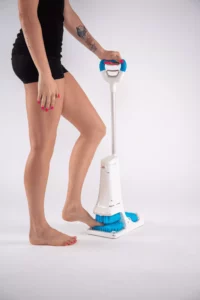In the world of diabetes care, one question that may arise is whether or not it is safe to share a diabetic foot scrubber with someone else. It might seem like an innocuous act, especially if you are sharing with someone you are close to, like a family member or a friend. However, there are numerous factors to consider before deciding to share this personal care tool. This article aims to provide detailed insights into this question, highlighting critical aspects including the nature of diabetic foot infections and risks, the role of personal hygiene in diabetes care, how sharing personal care tools can lead to the spread of infections, the correct way to clean and sterilize diabetic foot scrubbers, and finally, the ethical and health considerations involved in sharing diabetic foot care tools.
The first section, Understanding Diabetic Foot Infections and Risks, will delve into the complications diabetes can cause for foot health, explaining why people with diabetes need to take special care of their feet. Following that, we will talk about the Importance of Personal Hygiene in Diabetes Care, emphasizing why maintaining good hygiene practices is crucial for those with this chronic condition.
Next, we will discuss How Sharing Personal Care Tools Can Spread Infections, providing a deeper understanding of the potential risks involved in sharing items like foot scrubbers. In the segment on Proper Cleaning and Sterilization of Diabetic Foot Scrubbers, we will offer practical advice on how to clean and sterilize these tools to reduce the risk of infection.
Lastly, we will explore the Ethical and Health Considerations for Sharing Diabetic Foot Care Tools. This section will reflect on the responsibility we hold towards ourselves and others when it comes to personal health and safety. By the end of this article, readers will have a comprehensive understanding of the risks and precautions associated with sharing diabetic foot scrubbers.
Understanding Diabetic Foot Infections and Risks
Diabetes, a chronic condition that impacts the body’s ability to process sugar, often leads to several complications, including foot problems. These foot issues are primarily due to two significant complications associated with diabetes: nerve damage (neuropathy) and poor circulation. Neuropathy causes numbness in the feet, making it challenging to feel sores, cuts, or blisters. Poor circulation, on the other hand, reduces the body’s ability to heal, resulting in minor injuries potentially becoming significant infections.
Understanding diabetic foot infections and their associated risks is a critical aspect of diabetes care. Diabetic foot infections can range from simple superficial ulcers to more complex infections involving tissues, bones, and joints. These infections often occur because of the foot’s decreased sensation and compromised immune response, making it easy for bacteria and other pathogens to invade and thrive.
Without proper care and prompt treatment, these infections can cause serious consequences like chronic wounds, gangrene, and even amputation. Therefore, it’s crucial for individuals with diabetes to take precautionary measures to minimize the risk of foot infections, such as maintaining good foot hygiene, wearing appropriate footwear, and using personal care tools like diabetic foot scrubbers correctly and safely.
Importance of Personal Hygiene in Diabetes Care
The importance of personal hygiene in diabetes care cannot be overstated. Diabetes, a chronic disease characterized by high blood sugar levels, can lead to various complications if not managed properly. One of these complications includes foot problems, which are commonly experienced by people with diabetes.
Maintaining personal hygiene is crucial in diabetes care as it serves as a preventative measure against potential infections, especially in the feet. People with diabetes are more susceptible to bacterial and fungal infections due to their impaired immune systems and poor blood circulation. This makes it even more critical for them to maintain personal hygiene, including foot care.
A diabetic foot scrubber is a tool often used by people with diabetes to keep their feet clean and free from dead skin and calluses, which could potentially lead to cracks or sores. It is crucial to understand that these scrubbers, when shared, can potentially transmit bacteria or fungal spores, leading to infections. Therefore, it is highly recommended not to share diabetic foot scrubbers with anyone else.
In essence, personal hygiene in diabetes care, including the individual use of diabetic foot scrubbers, is of paramount importance to prevent foot infections and complications. It is not just about cleanliness; it is a critical part of managing diabetes effectively.
How Sharing Personal Care Tools Can Spread Infections
Sharing personal care tools, especially those used in diabetes foot care like a foot scrubber, can potentially lead to the spread of infections. This is particularly risky for people with diabetes, as they tend to be more susceptible to infections due to their compromised immune system.
The foot scrubber, used in the care of diabetic feet, often comes into contact with dead skin cells and potential foot sores or ulcers. If these tools are shared without proper sterilization, they can carry bacteria or fungi from one person to another. This risk is even higher if one or both individuals have open sores or cuts on their feet, a common occurrence in people with diabetes.
In addition, people with diabetes often experience reduced blood flow to their feet, which can slow the healing of wounds and increase the risk of infections. This makes the sharing of personal care tools such as a foot scrubber even more dangerous.
In conclusion, it is highly recommended to avoid sharing diabetic foot scrubbers to prevent the spread of infections. Personal hygiene and cleanliness play a critical role in managing diabetes and its complications, and this includes the exclusive use of personal care tools.
Proper Cleaning and Sterilization of Diabetic Foot Scrubbers
Proper cleaning and sterilization of diabetic foot scrubbers is an essential part of diabetes care and general personal hygiene. Foot scrubbers, much like other personal care tools, can harbor a variety of bacteria and other harmful microorganisms if not cleaned and sterilized properly. This is especially significant for individuals with diabetes, as they are often more susceptible to infections due to the disease’s impact on the immune system.
Diabetic foot scrubbers are typically used to remove dead skin and promote better foot health. However, during this process, they can also come into contact with blood and other body fluids, making them a potential source of infection if reused or shared without proper sterilization. The risk is even higher if the person using the scrubber has a foot infection, a common complication in people with diabetes.
To sterilize a diabetic foot scrubber, it should be cleaned thoroughly with warm water and soap, then soaked in a disinfectant solution, and finally, allowed to air dry. This process should be carried out after each use to minimize the risk of infection. It is also advisable to replace the scrubber regularly, as the scrubbing surface can become worn and less effective over time.
Sharing a diabetic foot scrubber with someone else, even after proper sterilization, is not recommended due to the potential risks involved. Each person should have their personal care tools to prevent cross-contamination and the spread of infections.
Ethical and Health Considerations for Sharing Diabetic Foot Care Tools
When it comes to the management and care of diabetes, there are many aspects to consider, one of which includes foot care. Diabetic foot care tools, such as diabetic foot scrubbers, play a crucial role in this process. However, sharing these tools raises both ethical and health considerations.
From a health perspective, sharing diabetic foot care tools can pose significant risks. Diabetic patients often have compromised immune systems, making them more susceptible to infections. When tools like foot scrubbers are shared, even after cleaning or sterilization, there’s a risk of transmitting infections. This is because some bacteria or fungi can survive and be transmitted to the next user, particularly if the person has any open wounds or sores, which are common in diabetic foot conditions.
The ethical considerations also play a substantial role. When you share personal care tools, you may inadvertently put another person’s health at risk, which raises questions about responsibility and respect for others’ well-being. In the case of diabetic foot scrubbers, it’s crucial to consider the potential harm you could cause to another person by sharing these tools.
Therefore, it’s generally advised not to share diabetic foot care tools with others. Instead, each person should have their own set of tools, which should be regularly cleaned and sterilized to minimize the risk of infections. This approach ensures both the safety and the privacy of each individual, which are essential aspects of effective diabetes care.




